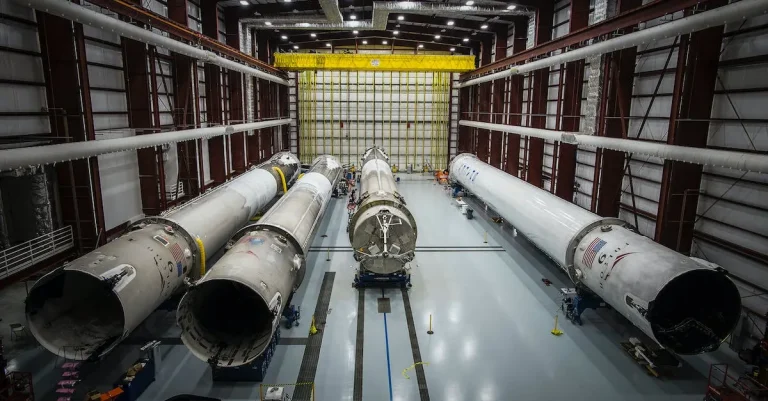Is Food Science A Good Career?
From product development to quality control, food scientists play a crucial role in creating new food items and ensuring food safety. If you’re curious whether food science is a promising career path, this comprehensive guide will walk through key factors to consider.
If you’re short on time, here’s a quick answer: Food science is generally an excellent career choice offering competitive salaries, strong job growth, and opportunities to innovate within a vital global industry.
What is Food Science?
Food science is a multidisciplinary field that combines elements of biology, chemistry, and engineering to study the production, processing, and distribution of food. It involves understanding the physical, chemical, and biological properties of food, as well as the factors that affect its quality, safety, and nutrition.
Studying Food Production
One aspect of food science is studying the production of food. This involves examining agricultural practices, such as crop cultivation and animal husbandry, to ensure that food is grown and raised in a sustainable and efficient manner.
Food scientists also analyze the impact of factors like soil quality, climate, and pest management on food production.
By studying food production, food scientists can help improve agricultural practices to increase yields, reduce waste, and enhance the nutritional value of crops and livestock. This knowledge is crucial for feeding a growing global population and ensuring food security.
Ensuring Safety and Quality
Another important aspect of food science is ensuring the safety and quality of food. Food scientists work to prevent contamination and the spread of foodborne illnesses by developing and implementing food safety standards and regulations.
They also conduct research on food processing techniques to minimize the loss of nutrients and maintain the quality and taste of food.
Food scientists play a crucial role in conducting risk assessments and evaluating food additives and preservatives to ensure they are safe for consumption. They also work closely with food manufacturers and regulatory agencies to monitor and enforce food safety standards throughout the supply chain.
According to the World Health Organization (WHO), an estimated 600 million people fall ill and 420,000 die each year due to contaminated food. Food science plays a vital role in preventing such incidents and safeguarding public health.
Product Development
Food science also involves product development, where scientists create new food products or improve existing ones. This process often includes conducting sensory evaluations to assess taste, texture, and appearance, as well as analyzing nutritional content and shelf life.
Food scientists work closely with food manufacturers to develop innovative products that meet consumer demands, such as healthier alternatives, gluten-free options, or plant-based alternatives. They also play a role in reducing food waste by finding creative ways to utilize by-products and develop sustainable packaging solutions.
According to the United States Department of Agriculture (USDA), food product development is essential for the growth of the food industry and meeting changing consumer preferences.
Strong Job Growth
Food science is a promising career choice due to its strong job growth in recent years. The expanding food industry has played a significant role in creating numerous job opportunities for food scientists.
As people become more health-conscious and demand for quality and safe food increases, the need for skilled professionals in this field has soared. According to the U.S. Bureau of Labor Statistics, the employment of food scientists and technologists is projected to grow by 5% from 2020 to 2030, faster than the average for all occupations.
This growth is fueled by several factors.
Expanding Food Industry
The food industry is expanding rapidly, driven by factors such as population growth, urbanization, and changing consumer preferences. With the rise in global population, the demand for food products has increased significantly.
As a result, food companies are constantly innovating and introducing new products to meet consumer demands. This growth has created a need for food scientists who can develop and improve food products, ensuring their safety, quality, and nutritional value.
Whether it’s developing plant-based alternatives, creating new flavors, or improving food preservation techniques, food scientists are at the forefront of these developments.
Retirement of Current Workforce
Another factor contributing to the strong job growth in food science is the retirement of the current workforce. Many experienced professionals in this field are reaching retirement age, creating vacancies that need to be filled by new talent.
This presents an excellent opportunity for individuals considering a career in food science. With the retiring workforce, there is a growing demand for young professionals who can bring fresh perspectives, innovative ideas, and updated knowledge to the industry.
This demand opens doors for career advancement and the chance to make a significant impact in the field.
Advances in Technology
Advances in technology have revolutionized the food industry, and food scientists play a vital role in leveraging these advancements. From the development of new food processing techniques to the use of cutting-edge analytical tools, technology has enabled food scientists to enhance food safety, quality, and efficiency.
For instance, the use of genetic engineering has allowed for the creation of crops with improved nutritional content and resistance to pests. Additionally, the application of artificial intelligence and machine learning has facilitated the analysis of vast amounts of data, leading to more informed decision-making in areas such as product development and quality control.
As technology continues to advance, the demand for skilled food scientists who can harness its potential will only increase.
Lucrative Salaries
One of the key factors that make food science an attractive career option is the potential for lucrative salaries. Food scientists are highly sought after in various industries, leading to competitive compensation packages.
Starting and Median Pay
Food science graduates can expect to earn a respectable starting salary. According to the Bureau of Labor Statistics, the median annual wage for food scientists and technologists was $65,300 in May 2020.
However, it is important to note that salaries can vary depending on factors such as education, experience, location, and the industry in which one works.
Entry-level positions in the food industry typically offer competitive salaries, with the potential for growth as one gains experience and expertise. As individuals progress in their careers and take on more responsibilities, they can see significant increases in their earning potential.
Salary Variation by Industry
The salary potential in food science can also vary based on the industry in which one works. Some sectors may offer higher salaries as compared to others. For example, food scientists working in research and development or manufacturing might earn higher salaries than those working in quality control or regulatory affairs.
Additionally, food scientists employed in the pharmaceutical or biotechnology industries may also receive higher compensation due to the specialized nature of their work. It’s worth noting that salaries can also vary depending on the size of the company, geographical location, and market demand for food science professionals.
For more detailed information on salary ranges and industry-specific data, websites like PayScale and Glassdoor can provide valuable insights.
Abundant Career Paths
Choosing a career in the field of food science opens up a wide range of opportunities. With the ever-growing demand for innovative and sustainable food products, there is a need for professionals who can contribute to the development, production, and safety of our food.
Here are a few career paths one can pursue in the field of food science:
Food Scientist
A food scientist plays a crucial role in creating new food products or improving existing ones. They utilize their expertise in chemistry, biology, and nutrition to develop innovative recipes, enhance flavors, and improve food quality.
Food scientists work closely with research teams to analyze and test food samples, ensuring that they meet safety and quality standards. They also collaborate with marketing teams to understand consumer preferences and develop products that align with market trends.
According to the Bureau of Labor Statistics, the median annual wage for food scientists was $65,160 in May 2020.
Food Engineer
Food engineers focus on the technical aspects of food production. They are responsible for designing and optimizing food processing techniques, improving efficiency, and ensuring food safety. These professionals use their knowledge of engineering principles to develop machinery and equipment for food production.
They also work on developing packaging solutions that preserve food quality and extend shelf life. Food engineers often collaborate with food scientists and other professionals to ensure that food products meet both technical and nutritional requirements.
The median annual wage for agricultural engineers, which includes food engineers, was $80,720 in May 2020, according to the Bureau of Labor Statistics.
Food Safety Inspector
Food safety inspectors play a critical role in ensuring that food products meet regulatory standards and are safe for consumption. They conduct inspections at various stages of the food production process, from farm to table, to ensure compliance with food safety regulations.
These inspectors examine food samples, inspect processing facilities, and review records to identify potential hazards and violations. They also educate food handlers and operators on proper hygiene practices and food safety protocols.
The median annual wage for food inspectors was $47,480 in May 2020, according to the Bureau of Labor Statistics.
These are just a few examples of the many career paths available in the field of food science. Whether you are passionate about research and development, engineering, or ensuring food safety, a career in food science can offer exciting and fulfilling opportunities.
Challenges in Food Science
While a career in food science can be rewarding, it also comes with its fair share of challenges. Here are some of the main challenges that professionals in this field may face:
1. Food Safety
Ensuring the safety of our food supply is of utmost importance. Food scientists must constantly stay updated on the latest regulations and guidelines to prevent foodborne illnesses and contamination. They are responsible for conducting thorough inspections, implementing quality control measures, and developing new methods to improve food safety.
2. Consumer Expectations
Consumers today have higher expectations when it comes to the quality and nutritional value of the food they consume. Food scientists need to stay ahead of consumer trends and preferences, while also meeting regulatory requirements.
This can be challenging as consumer preferences can vary greatly, making it necessary to constantly innovate and develop new products that align with changing consumer demands.
3. Technological Advances
The food industry is constantly evolving, with new technologies emerging all the time. Food scientists need to stay up to date with the latest advancements in food processing, packaging, and preservation techniques.
This requires continuous learning and professional development to ensure they are equipped with the knowledge and skills to implement these technologies effectively.
4. Sustainability
In today’s world, sustainability is a key concern for many consumers. Food scientists are tasked with finding ways to develop sustainable food production methods, reduce waste, and minimize the environmental impact of food manufacturing processes.
This can involve researching and implementing new techniques such as reducing water usage, improving energy efficiency, and finding alternative packaging materials.
5. Globalization
The food industry is now more globalized than ever before, with food products being imported and exported across borders. This presents challenges in terms of ensuring consistent quality, adhering to international regulations, and managing supply chains effectively.
Food scientists need to have a deep understanding of global food regulations and be able to navigate the complexities of international trade.
According to the World Health Organization (WHO), an estimated 600 million people fall ill and 420,000 die each year from contaminated food. This highlights the importance of the work that food scientists do in addressing food safety challenges.
Despite these challenges, a career in food science can be highly rewarding, as it allows professionals to contribute to the development of safe, nutritious, and sustainable food products that impact the health and well-being of millions of people worldwide.
Conclusion
In conclusion, food science offers diverse, well-compensated career opportunities with strong projected growth due to factors like technological progress and population expansion. For individuals interested in innovating with food and promoting public health, food science provides the chance to make a difference within a thriving industry.
With competitive salaries, abundant jobs, and roles in essential areas like safety and new product development, food science stands out as a truly rewarding career path for the future.







